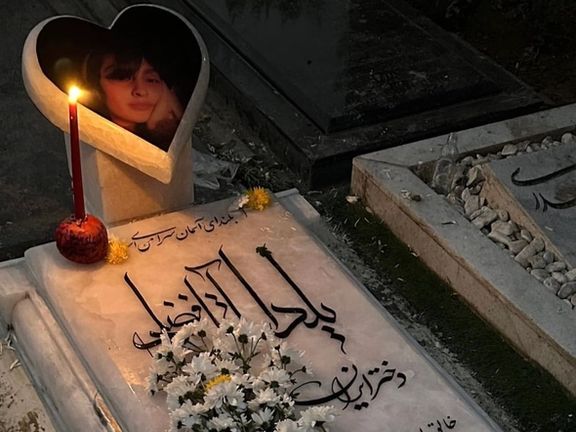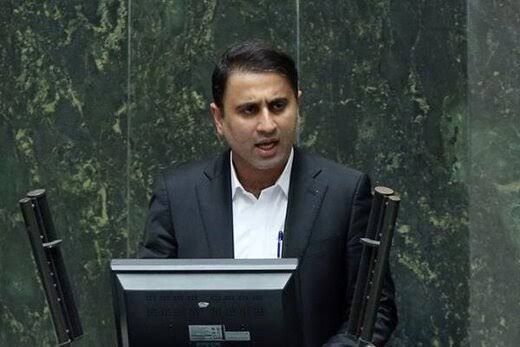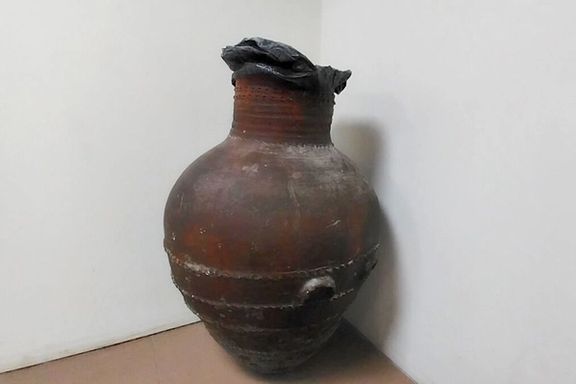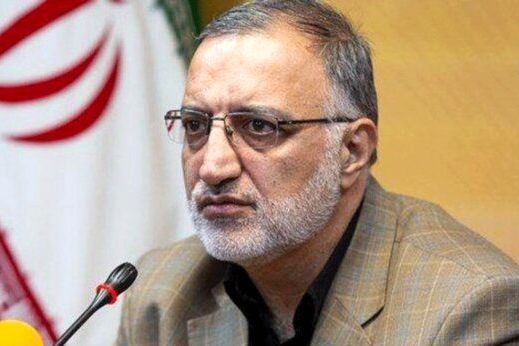Iran Bans Commemoration Ceremony Of Slain Protester

The father of one of the victims of the 2022 protests in Iran has disclosed that security forces summoned him and prohibited the commemoration event for his daughter.

The father of one of the victims of the 2022 protests in Iran has disclosed that security forces summoned him and prohibited the commemoration event for his daughter.
Mehrdad Aghafazli, Yalda Aghafazli's father, shared on his Instagram post on Saturday night that after visiting the authorities, security forces explicitly stated, "You have no right to hold any ceremony." When he responded, expressing his intention to organize a private event, they reportedly asserted, "Even that is not your right."
Yalda Aghafazli, a 19-year-old protester, was detained during the October 26 demonstrations in Tehran. She went on a hunger strike to protest the prison conditions and was released without accepting any of her charges. However, a few days later, she died under suspicious circumstances, and her body was buried under strict security measures.
Aghafazli mentioned that security forces, implicitly threatening him, said, "We are watching you." In response, he told them, "I am glad you have been after me for a year. I am no longer afraid. My fear was for my daughter's life and future, which she lost. Now, my only fear is that you come and harm the people attending my daughter's ceremony. I apologize to their mothers and fathers."
The incident is the latest in a string of ceremonies banned by security forces over the years, and harassment and imprisonment of the families of activists dating back to the 1980s. It worsened after the death of Mahsa Amini last year. Additionally, families of slain protesters continue to be harrassed.
On the anniversary of the death of Javad Heydari, who was shot by security forces in the first wave of protests in September last year, agents arrested his brother and several other family members. His sister, Fatemeh, reported that security forces fired tear gas into their house as well as deploying troops to the village to quash any gatherings.

Iran's dire nursing shortage is now causing fatalities in hospitals as over 3,000 nurses leave the country annually.
Mohammad Sharifi Moghadam, the Secretary-General of the Nursing Association said "patients are dying due to the shortage of nurses." He emphasized the dissatisfaction among nurses, revealing that official statistics indicate over 90% of them are unhappy with their work, raising serious concerns about the quality of patient care.
The destinations for migrating nurses are predominantly Germany, the United States, Australia, and Canada. He highlighted the challenges of compensating for the loss of experienced and professional nursing staff, making it a daunting task.
Sharifi Moghadam recently reported a shortage of 70,000 nurses. Iran's leading economic daily Donyaye Eqtesad newspaper, in a May report, disclosed that over 10,000 doctors and nurses had left Iran in the previous year. Over the past four years, the country has witnessed the migration of 16,000 general practitioners.
Last week, the ILNA news agency reported that nurses receive a mere 2.4 to 3.1 dollars for each overtime hour, leading to increased dissatisfaction within the nursing community at a time when the country's economy is at its deepest crisis in decades.
Health system indicators suggest that there should be three nurses per thousand citizens or two nurses per hospital bed. Reports indicate that Iran's current ratio falls below half of the minimum health requirements, raising concerns about the adequacy of healthcare services.

An Iranian lawmaker has criticized an initiative to devise a 5-year development plan for Gaza, saying it is the responsibility of Palestinians, not Iranians.
MP for Chabahar, Moeinoddin Saeedi, told Roydad24 website in Tehran, “We have managed to complete only 20 percent of our own country's development plan and now they intend to write the first five-year development plan for Palestine as well.”
He went on say, "We must seek to solve the problems of our own country first. Our development programs have not been properly implemented and have failed to solve existing challenges."
Originally scheduled to end in 2021, Iran's sixth Five-Year National Development Plan has been extended until mid-2024. Even so, based on Parliament Research Center's analysis, so far just 30% of the plan was partially has been implemented, 40% remained untouched, and 30% could not be assessed. Yet, Saeedi said, the same organization has called for a developmental plan for Palestine since "Israel is approaching its last stage of collapse".

Since earlier this year, the Iranian regime has amplified its rhetoric heralding “an imminent collapse of the Zionist entity,” especially in the light of Israeli protests against Prime Minister Benjamin Netanyahu.
As part of its economic development, Iran devises multi-year plans as a guide for the executive branch and parliament, which is responsible for examining and approving the annual budget.
After over 18 months of delay, the seventh plan was finally presented to the parliament by the president Ebrahim Raisi earlier this year. Economists have called the plan a pointless bureaucratic exercise amid overall economic and political instability. In addition, lawmakers have expressed serious concerns about the plan's economic implications for the country, and despite making a number of changes, they have called it deficient.
Due to sanctions and growing corruption, Iranian governments have been unable to implement any meaningful development plans for more than a decade. Amid international isolation, Tehran has been highlighting its strategy to join non-Western blocs. However, even a former commander of the IRGC deemed the strategy of joining international organizations such as BRICS and SCO unproductive due to US sanctions.
There is also another significant plan called Iran's "Twenty-Year Vision Document", that essentially calls for Iran to be the leading nation in the region with regard to economic achievements by 2025, which is just two years away.
The question arises, however, why the regime is even entertaining the idea of helping Gaza’s development when they need the public’s vote for the upcoming Parliamentary elections in March. Even the conservatives have admitted that the general public lacks an appetite for the Palestinian cause.
Even a Holocaust denier such as former President Mahmoud Ahmadinejad has remained silent about the war in Gaza, refusing to repeat the regime’s talking points. His silence has led to state-controlled media repeatedly pressuring Ahmadinejad to say something.
Similarly, the leaders of the ultra-hardliner party Paydari have also remained generally silent on the war in Gaza.
As the regime actively refrains from assisting Hamas on the ground through the so-called Axis of Resistance, it appears as if it has two objectives in mind. First to send a message to Palestinians that although they are not providing much assistance at the present time, they will help during the post-war period with the rebuilding process, as well as hinting to others in the region that they are interested in remaining involved in the negotiations and participating in post-war decisions, a point that is further reinforced when Iran has been asked to participate at the summit in Saudi Arabia about the Gaza situation.
But the Iranian public remains very sensitive toward the issue of spending money on militant groups in other countries, when they have to endure a 50-percent annual inflation rate. The regime is also concerned about a wider war, which could involve the United States, with incalculable consequences.

A clay jug dating back to the Medes period is now serving as a trash bin in a museum in Iran's Archaeological Museum of Rasht.
An official from the museum has claimed it is to prevent the potential theft of conventional wooden and plastic bins. Iran, celebrated for its millennia-old cultural heritage, encounters challenges in safeguarding such invaluable artifacts.
The neglect, insufficient maintenance, and environmental impacts on some historical sites and artifacts further intensify worries about the overall state of preservation.
The shift towards emphasizing Islamic culture since the 1979 Islamic Revolution has often led to a more conservative stance on pre-Islamic relics. The present Iranian regime appears hesitant to fully embrace its profound historical legacy, despite having once presided over the world's largest empire.
The development unfolds amid the backdrop of extensive collections of ancient Persian artifacts excavated by foreign archaeologists before the twentieth century.
The artifacts grace renowned museums worldwide, including the Louvre in Paris, the British Museum in London, the University of Chicago's Oriental Institute Museum, and the State Hermitage Museum in Saint Petersburg, all housing significant Persian antiquities.

Tehran’s mayor, hardliner politician Alireza Zakani, has called on his counterparts in Muslim countries “not to allow the issue of Palestine to be forgotten.”
Zakani, who was a presidential candidate in 2021 and received the post after losing the election, wrote to mayors of cities in Islamic countries, stating that Israel’s attack on Gaza was “among the biggest crimes of the past century.”
Reiterating the Islamic Republic’s pro-Hamas rhetoric, Zakani blamed the United States and “a handful of European countries” for standing by Israel and insisted that the Palestinian cause is part of the anti-imperialist campaign. He told his counterparts that Muslim mayors have a serious duty and responsibility to defend Gaza.
The Iranian regime immediately congratulated Hamas on October 7 as the militant group launched its terror attack on Israel. The government ordered street celebrations, but the Iranian public has shunned pro-Hamas gatherings, unlike large rallies in Western capitals.
Many Iranians are opposed to the government’s policy of spending billions of dollars to create and support militant groups throughout the region. They believe that the regime’s anti-West and anti-Israel foreign policy has impoverished the country.
Zakani asked his counterparts in the Muslim world to help pressure their government to cut all ties with Israel and apply sanctions. Iran’s president Ebrahim Raisi made the same proposals in a summit of Muslim leaders in Saudi Arabia on Saturday.
He also asked them to support “popular gatherings” in support of Palestinians in their cities, a policy the Iranian regime applies regularly, by distributing free food to the crowds to encourage a larger turnout.

Israel defense minister Yoav Gallant threatened a heavy cost for the Lebanese if Hezbollah “crossed the red line” as the leader of the group was delivering a speech.
The Israeli army and Iran-backed Hezbollah have clashed almost daily since Israel started its war on Gaza in retaliation for the Hamas attack on 7 October.
Gallant held a press conference Saturday afternoon local time, almost the same time as Hezbollah leader Hassan Nasrallah delivered his televised speech.
“Hezbollah is close to making a grave mistake and the ones who will pay the price are first of all the citizens of Lebanon,” Gallant said. “What we do in Gaza we know how to do in Beirut.”
Both sides issued statements and videos Saturday, detailing their operations and claiming victories –in what many say increasingly looks like a prologue to an all-out war.Neither side has made a gesture that would alleviate that fear.
In his speech Saturday, Nasrallah boasted about Hezbollah’s capabilities, claiming that his armed men had used new types of weapons and struck new targets in Israel.
"This front will remain active," he stated.
Reporters who have visited border areas of Lebanon and Israel say the reality on the ground is more serious than many think and that “there is a sense of impending conflict.
Hezbollah is much stronger than Hamas. It is by far the strongest group in what the regime in Iran calls the Axis of Resistance, including militias in Iraq, Syria and Yemen –besides Hezbollah and Hamas.
The Islamic Republic openly (and materially) supports these groups but maintains that they all act independently, avoiding direct responsibility for their military operations against Israel and American interests in the region. The Iranian regime immediately celebrated Hamas’ October 7 terror attack on Israel.
Coinciding with Nasrallah’s speech, Iran’s President Ebrahim Raisi met with Saudi crown prince Mohammad bin Salman on the sidelines of the summit of the Organisation of Islamic Cooperation (OIC) in Riyadh.
There, Raisi called on Islamic governments to designate Israel’s military a “terrorist organization” and asked those Muslim countries who have diplomatic ties with Tel Aviv to sever those ties.
“There is no other way but to resist Israel, we kiss the hands of Hamas for its resistance against Israel," Raisi said in his address to the summit.
Some other member states, including UAE, Bahrain and Saudi Arabia, reportedly rejected Iran’s suggestions, including a ban on the US use of their airspace to deliver weapons to Israel.
Still, the event turned out to be a rare show of unity from OIC members, who called Israel’s bombardment of Gaza “barbaric” and demanded that the UN security council adopt “a binding resolution” to halt Israel’s “aggression”.
Hosting the summit, Saudi crown prince Mohammad bin Salman condemned Israel’s “continuing aggression, occupation and forced displacement of the people of Gaza and said Israel bears responsibility for the “crimes committed against the Palestinian people.”
“Israel’s flagrant violations of international laws must be stopped,” he said.
More than 11,000 Palestinians have been killed in Israeli airstrikes since 8 October, a significant majority of them women and children, according to the United Nations.
Hundreds of thousands of people marched in various countries Saturday, protesting Israel’s military operation and demanding a humanitarian ceasefire.
Israeli Prime Minister Benjamin Netanyahu, however,insists on carrying on. “The battle to crush Hamas” would continue with “full force”, he said Saturday.